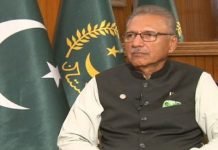NEW YORK: The 193-member United Nations General Assembly deplores Russian attack on Ukraine with overwhelming majority while Pakistan refuses to condemn Russia.
Despite increasing pressure from the West to condemn the Russian attack on Ukraine, Pakistan’s Ambassador to the United Nations delivered a carefully-worded speech at the emergency session of the General Assembly on Wednesday, calling for de-escalation of tensions and sustained dialogue.
Ambassador Munir Akram, Pakistan’s Permanent Representative at the world body, did address the General Assembly but abstained from voting on a resolution that “deplored” the military action against Ukraine and “demands” Russia withdraw from its neighbouring country.
In his speech, Ambassador Akram did not condemn Russia’s military action against Ukraine but emphasised that “Pakistan is committed to the fundamental principles of the UN Charter: self-determination of peoples, non-use or threat of use of force, sovereignty and territorial integrity of states, and pacific settlement of disputes”.
He did not mention Russia in his speech, where he also stressed that Pakistan upheld the “principle of equal and indivisible security for all” in a statement that appeared to refer to the concerns of Russia that led to its military offensive against Ukraine.
Russia had sought guarantees from the West and the US, calling upon them not to expand NATO and avoid conducting military drills at its borders. But the US and its Western allies had turned down both the demands, leading to the collapse of diplomatic efforts.
Ahead of the UNGA emergency session, first in two decades and 7th overall, Pakistan was asked by the members of the European Union, the UK, Canada, Australia, Japan and other countries to vote in favour of the resolution against Russia. But Pakistan resisted the pressure and opted to abstain from voting in order to maintain a fine balance in the Russia-Ukraine conflict.
Without explicitly saying, the Pakistani envoy also referred to selective application of the UN Charter and international law. “These principles must be consistently and universally respected,” Ambassador Akram stressed in an apparent reference to an indifferent approach by the Western countries towards the plight of Palestinians and Kashmiris.
Nevertheless, Ambassador Akram said Pakistan remained deeply concerned at the recent turn of events. “This reflects a failure of diplomacy,” he said. He also mentioned that Prime Minister Imran Khan had regretted the latest situation between Russia and Ukraine, and said that Pakistan had hoped that diplomacy could avert the military conflict.
“We have since repeatedly stressed the need for de-escalation, renewed negotiations, sustained dialogue, and continuous diplomacy,” he further said in a three-and-a-half minute speech. He stressed that all efforts must be made to avoid further escalation of violence and loss of life as well as military, political and economic tensions, which could pose an unprecedented threat to international peace and security and global economic stability.
“As consistently underlined by Prime Minister Imran Khan, the developing countries are hit the hardest economically by conflict anywhere,” he said. He added that Pakistan hoped the talks initiated between representatives of the Russian Federation and Ukraine would succeed in bringing about a cessation of hostilities and normalisation of the situation.
“A diplomatic solution in accordance with relevant multilateral agreements, international law, and the provisions of the UN Charter is indispensable,” he said. Pakistan, he added, also supported all efforts to provide humanitarian relief to civilians in the affected areas.
“The Government of Pakistan is most concerned about the safety and welfare of Pakistani citizens and students in Ukraine. The majority of them have been evacuated. Those who remain will be evacuated soonest. We appreciate the cooperation of the Ukrainian authorities as well as the Polish, Romanian and Hungarian governments in this context.”
The session of the UN General Assembly that began on February 28 was the first emergency sitting of the 193-member body in more than two decades and just the 7th in the 77-year history of the United Nations.
Read more: Talks between India, Pakistan over controversial water projects remained inconclusive







